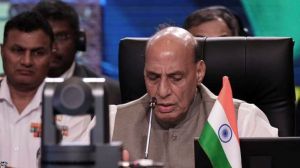Addressing reporters alongside visiting German Chancellor Olaf Scholz on Friday, Prime Minister Narendra Modi announced that Germany has decided to raise the annual visa quota for skilled Indian professionals from 20,000 to 90,000.
While this fourfold increase will enhance economic and professional ties between the two countries, the move is also designed to make up for labour shortage that Germany might be facing owing to an ageing population.

In 2014, around 27% of the German population was 60 and above, a number that is expected to touch 35% by 2030, as per statistics. The increased quota will come in handy in labour-intensive sectors such as nurses and elderly care, childcare, truck drivers and middle-level jobs in the engineering and IT sectors.
Story continues below this ad
Talking to reporters in New Delhi later in the day, visiting German Foreign Minister Annalena Baerbock said, “In Indian society, there are so many young skilled people driving the labour market. In Germany, we need labour. This could be a win-win situation for the people in India and Germany.”
According to the latest figures from the German Academic Exchange Service (DAAD), as many as 49,483 international students from India were studying in Germany during the 2023-24 winter semester. This marks a 15% increase compared to the previous year, making Indians the largest group of international students in the country, surpassing China.
Talking of the migration and mobility agreement that India and Germany signed in 2022, Baerbock said they have recorded a 25% increase in the number of students and professionals coming to Germany, and the potential is even higher.
German Labour and Social Affairs Minister Hubertus Heil said their country has recently set up a new framework of legal requirements for immigrating to the country, including the visa digitisation programme and connecting job seekers and businesses. While visa waiting time has been reduced, those seeking to live and work in Germany for a longer period will be preferred for immigration and other benefits.
Story continues below this ad
He said German language proficiency remains among the prerequisites for those seeking to study or work in Germany. He said the German authorities are aware that Indians may prefer English-speaking countries like the US and the UK. But it is necessary to learn German for Indians to be able to work in a variety of jobs, he said. “It is very important in our economic interest for more people to learn the language in our country,” he said.
Heil called India an “ideal partner” as the world’s most populous country with a huge workforce. He said there was “good progress” on attracting skilled labour to Germany, particularly “in the sectors where we need them most urgently — medicine, nursing care and IT sector”.
“Our aim is to enthuse even more skilled workers from your country for Germany,” Scholz told Modi. “The number of Indians working in Germany has grown by 23,000 in the past year alone,” he noted during the 18th Asia-Pacific Conference of German Business 2024.
He highlighted that Indian students currently represent the largest group of foreign students in German universities, emphasising their value to the German labour market.
Story continues below this ad
He also announced plans to improve the visa application process through digitisation and faster processing to make the experience more user-friendly. However, he clarified that Germany aims to reduce migration rates for individuals not classified as part of the skilled workforce.
There is also an increased realisation in Germany to not repeat the mistakes during the previous large-scale migration to the country — in the 1960s and ’70s. Heil said. “We tried to hire a workforce, but we got human beings,” he said, adding that for those immigrating now, they offer “health insurance, universities without fees and a lot of respect”.









